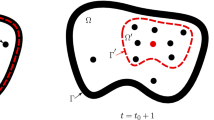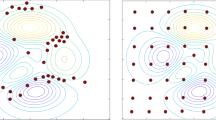Abstract
We have developed an algorithm using a Design of Experiments technique for reduction of search-space in global optimization problems. Our approach is called Domain Optimization Algorithm. This approach can efficiently eliminate search-space regions with low probability of containing a global optimum. The Domain Optimization Algorithm approach is based on eliminating non-promising search-space regions, which are identifyed using simple models (linear) fitted to the data. Then, we run a global optimization algorithm starting its population inside the promising region. The proposed approach with this heuristic criterion of population initialization has shown relevant results for tests using hard benchmark functions.
Preview
Unable to display preview. Download preview PDF.
Similar content being viewed by others
References
Chan, K.Y., Aydin, M.E., Fogarty, T.C.: A taguchi method-based crossover operator for the parametrical problems. In: Sarker, R., Reynolds, R., Abbass, H., Tan, K., McKay, B., Essam, D., Gedeon, T. (eds.) CEC 2003. Proceedings of the 2003 Congress on Evolutionary Computation, 8-12 December 2003, pp. 971–977. IEEE Computer Society Press, Los Alamitos (2003)
Chen, S., Smith, S.: Improving genetic algorithms by search space reduction (with applications to flow shop scheduling). In: GECCO 1999. Proceedings of the Genetic and Evolutionary Computation Conference, Morgan Kaufmann, San Francisco (1999)
Cribari-Neto, F., Zarkos, S.G.: Econometric and statistical computing using ox. Comput. Econ. 21(3), 277–295 (2003)
Eberhart, R.C., Kennedy, J.: A new optimizer using particle swarm theory. In: Proceedings of the Sixth International Symposium on Micromachine and Human Science, Nagoya, Japan, pp. 39–43 (1995)
Goldberg, D.E.: Genetic Algorithms in Search, Optimization, and Machine Learning. Addison-Wesley, Reading (1989)
Hinkelmann, K., Kempthorne, O.: Design and Anaysis of Experiments: Introduction to Experimental Design. In: Wiley Series in Probability and Mathematical Statistics, vol. 1 (1994)
Liang, K.-H., Yao, X., Newton, C.: Evolutionary search of approximated n-dimensional landscapes. International Journal of Knowledge-Based Intelligent Engineering Systems 4(3), 172–183 (2000)
Lung, Y.W., Wang, Y.: An orthogonal genetic algorithm with quantization for global numerical oplimization. IEEE Transactions on Ewlurionary Computation 5, 41–53 (2001)
Magalhaes, S.R.S.: A avaliação de métodos para a comparação de modelos de regressão por simulação de dados. Master’s thesis (Mestrado em Estatística e Experimentação Agropecuária), Universidade Federal de Lavras, Lavras (2002)
Montgomery, D.C.: Design and Anaysis of Experiments, vol. 1. John Wiley and Sons, Chichester (1997)
Myers, R.H., Montgomery, D.C.: Response Surface Methodology: Process and Product Optimization Using Designed Experiments, 2nd edn. Wiley, Chichester (2002)
Pelikan, M., Goldberg, D.E., Cant-paz, E.: Linkageproblem, distribution estimation and bayesian networks. Evolutionary Computation 3(8), 311–340 (2000)
Reeves, C.R., Wright, C.C.: Epistasis in genetic algorithms: an experimental design perspective. In: 6th International Conference on Genetic Algorithms, Morgan Kaufmann, San Francisco (1995)
Reeves, C.R., Wright, C.C.: An experimental design perspective on genetic algorithms. In: Whitley, D., Vosa, M. (eds.) Foundations of Genetic Algorithms 3, Morgan Kaufmann, San Francisco (1995)
Srinivas, M., Patnaik, L.M.: Learning neural network weights using genetic algorithms- improving performance by search-space reduction. In: 1991 IEEE International Joint Conference on Neural Networks, November 18-21, 1991, pp. 2331–2336. IEEE Computer Society Press, Los Alamitos (1991) IEEE Cat. No. 91CH3065-0
Storn, R., Price, K.: Differential evolution - a simple and efficient heuristic for global optimization over continuous spaces. Journal of Global Optimization 11(4), 341–359 (1997)
Suganthan, P.N., Hansen, N., Liang, J.J., Deb, K., Chen, Y.-P., Auger, A., Tiwari, S.: Problem definitions and evaluation criteria for the cec 2005 special session on real-parameter optimization. Technical Report KanGAL Report 2005005, Nanyang Technological University, Singapore (2005)
Wall, M.: Galib - a c++ library of genetic algorithm components (2006), http://lancet.mit.eduga/
Author information
Authors and Affiliations
Editor information
Rights and permissions
Copyright information
© 2007 Springer-Verlag Berlin Heidelberg
About this paper
Cite this paper
de Melo, V.V., Delbem, A.C.B., Pinto Júnior, D.L., Federson, F.M. (2007). Discovering Promising Regions to Help Global Numerical Optimization Algorithms. In: Gelbukh, A., Kuri Morales, Á.F. (eds) MICAI 2007: Advances in Artificial Intelligence. MICAI 2007. Lecture Notes in Computer Science(), vol 4827. Springer, Berlin, Heidelberg. https://doi.org/10.1007/978-3-540-76631-5_8
Download citation
DOI: https://doi.org/10.1007/978-3-540-76631-5_8
Publisher Name: Springer, Berlin, Heidelberg
Print ISBN: 978-3-540-76630-8
Online ISBN: 978-3-540-76631-5
eBook Packages: Computer ScienceComputer Science (R0)




